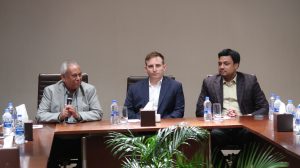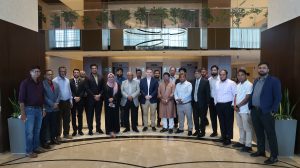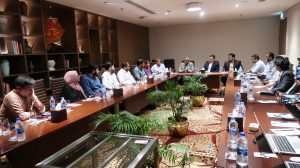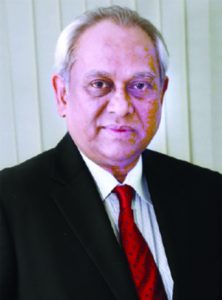Australia Bangladesh Chamber of Commerce and Industry Hosts Insightful Session on the Application of AI in Business Efficiency
PRESS RELEASE
Australia Bangladesh Chamber of Commerce and Industry Hosts Insightful Session on the Application of AI in Business Efficiency
Dhaka, 16 August 2025:
The Australia Bangladesh Chamber of Commerce (ABCC) successfully organized an engaging session titled “Application of AI in Business Efficiency” on August 16, 2025, at Sheraton Dhaka. The event brought together business leaders, entrepreneurs, and industry professionals to explore how Artificial Intelligence (AI) is transforming modern business operations.
Guest of Honour, Mr. Ben Carson, Trade and Investment Commissioner of the Australia High Commission Dhaka, Bangladesh, inaugurated the seminar. ABCCI President Mr. Syed Moazzam Hossain warmly welcomed all the participants and introduced the speaker, Mr. Sadiq M Alam and Mr. Alimuzzaman Nayan to them. ‘This event is designed for those who are passionate about networking opportunities with business professionals, sharing knowledge and insights on relevant industry topics’ he says. The chamber president also affirmed the chamber’s commitment on promoting Artificial Intelligence literacy among members, professionals for ensuring businesses remain resilient and prepared for the future.
The keynote presentations were delivered by Sadiq M Alam, Odoo Certified Functional Consultant, IT Entrepreneur, and Founder of Metamorphosis Ltd., and Alimuzzaman Nayan, Digital Business Transformation Expert. Both speakers shared their deep expertise and practical insights on leveraging AI for enhancing operational efficiency, reducing costs, and driving innovation across industries.
During the session, the presenters discussed the evolving spectrum of AI—from automation and predictive analytics to chatbots, workflow optimization, and hyper-personalization. Case studies and examples highlighted how AI is enabling organizations worldwide to streamline processes, improve decision-making, and enhance customer and employee experiences.
Following the keynote ABCCI President, Mr. Syed Moazzam Hossain, concluded the event with a vote of thanks and would continue to contribute to these types of events in the coming days as well.




